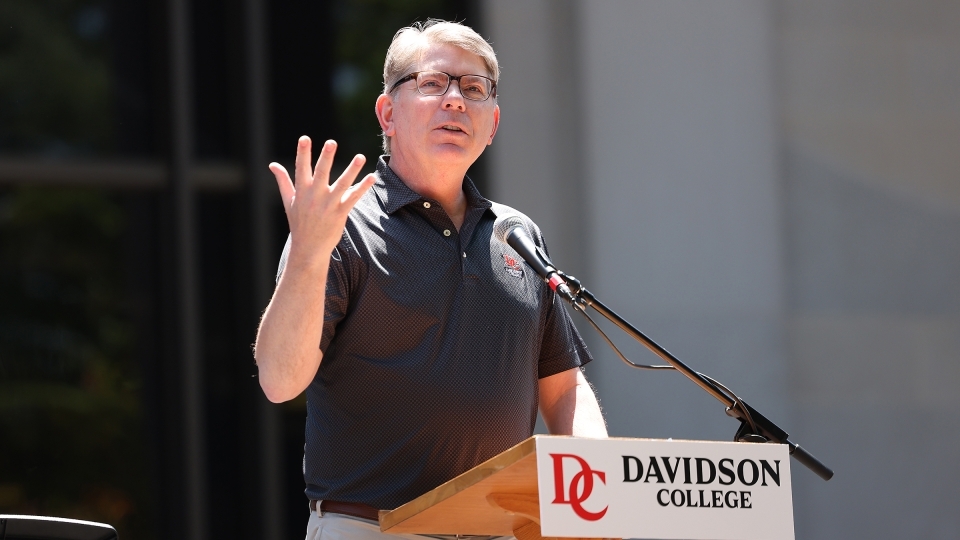A Leadership Credo: Showing Up With Intention
July 7, 2025
- Photography
- Chris Record

Having studied and taught about ethics and leadership, I now serve a college committed to educating leaders at a time when higher education faces intense scrutiny. While leadership is a complex terrain, I have never been more convinced of two things: We can teach people to be good leaders, and the world needs the leaders that Davidson is teaching.
Leadership discussions often devolve into clichés. As the late political scientist Richard Couto quipped, “There are two kinds of leadership books: those that are sold in airports, and those that are written in airports.” With the aim of avoiding empty truisms, I offer my beliefs about this critical topic:
Leadership means showing up. Every human being is equal in worth and is deserving of dignity. When we meet face-to-face, we are able to recognize each other’s humanity. Showing up signifies respect and confirms that they matter and their work matters.
Followers are vitally important in the leadership process. The best followers mirror qualities of good leaders: mutual respect, clear communication, dependability, and organizational competence.
Leadership is a team sport. Having the most individual talent is not the same as having a group who understands one another, knows their collective strengths and weaknesses, and energizes each other. I’ll take the more bonded team every time.
...it is a gift and opportunity to lead an organization or a cause in which you believe.
Knowing when to act — and when not to — defines leadership. In his essay “The Grace of Doing Nothing,” Theologian H. Richard Niebuhr warned against thinking we can control everything. It is hubris — at times, idolatry — to think we can fix the world. Well-intended actions can worsen a situation.
However, sometimes silence is inadequate to the occasion. We should act as we are able to act, with the trust (the faith, even) that we are contributing to a greater good within our context and capacity.
Character and truth-seeking are foundational to leadership. At Davidson, we ground our very purpose on cultivating humane instincts and dedicating ourselves to the quest for truth. This approach prepares graduates for leadership that appeals to what is true and what is right.
Ethics alone, though, won’t suffice to produce good leadership. It also requires effectiveness. Whatever else it is, leadership is about acting to get things done. But which action? Toward what purpose? This is where humane instincts and disciplined and creative minds, central to Davidson’s purpose, come into play.
Strategic reflection and planning drive effective leadership. Time to think and rest are essential to maintaining perspective and purpose. Nan Keohane, former president of both Wellesley and Duke, suggests leadership requires at least 50% thinking, leaving at most 50% for doing.


Humility is essential to leadership. We may think we have right on our side, but so do the other guys. Both interpersonal humility (showing kindness and mutual respect) and epistemic humility matter. As former Senator Howard Baker famously said, remember that the person across the table might be right. None of us is all-knowing.
Good leadership requires gratitude and produces joy. Gratitude is a reminder that it is a gift and opportunity to lead an organization or a cause in which you believe. Leaders from the late Pope Francis to Davidson alumnus Stephen Curry highlight how joy compels others to join in the shared work of leadership.
We at Davidson teach about leadership and prepare graduates to practice it in their lives and careers. It doesn’t happen by sitting on the sidelines and hoping that things change. I believe that when we act together, we can achieve goods greater than what any one of us can accomplish on our own.
This article was originally published in the Spring/Summer 2025 print issue of the Davidson Journal Magazine; for more, please see the Davidson Journal section of our website.



